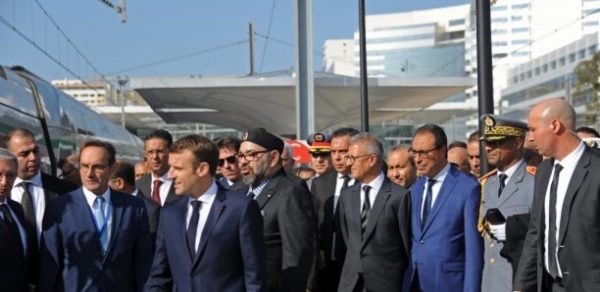Decryption. The controversy comes from the architect Pierre Atepa Goudiaby, candidate for the candidacy for the next presidential elections of Senegal. In an interview with the press, the now full-fledged politician makes a tasty comparison: “Do you also know that the Regional Express Train (Ter) of 30 km costs about 1 billion euros and that the Moroccan TGV that was inaugurated Thursday, cost two billion euros and is 300 km? When you are faced with choices like this, you say that it is not possible for us to manage a country like this, “says Pierre Atepa Goudiaby. What is the share of info and infox?
Morocco has inaugurated Al Boraq (named after the fast steed that transported the prophet of Islam in the story of the ascent), its TGV, Thursday, November 15, 2018. Senegal will cut the ribbons of his Train Regional Express in February 2019.
With the TGV, the route separating Tanger from Casablanca, 400 km long, half by high speed, falls at 2 hours 10 minutes against 4:30 in the past. The one separating Dakar from Blaise Diagne airport, 50 km away, should be connected in 48 minutes.
The Moroccan project was launched in 2007 but did not start until 2011, four years late. Senegal’s was launched in December 2016 for a planned delivery 26 months later.
Both books have French companies for suppliers and technical and financial partners. If Dakar proceeded by tender, Morocco conceded the work via a direct agreement that benefited Alstom to the detriment of Siemens, which is not unrelated to the refusal of the European Investment Bank to lend to Kingdom the necessary complement to financing.
It should be recalled that in the case of Senegal, the French Alstom was also selected at the end of the international call for tenders for the supply and commissioning of a fleet of rolling stock dual-mode self-propelled, gasoline or electric), ahead of the Norinco International Chinese.
The shadow of French French Alstom
On the Moroccan TGV, the purchase of the 12 Alstom Euroduplex trains was concluded by mutual agreement. The Ansaldo-Ineo consortium took care of the signaling and the telecoms, the Cegelec of the electric substations, the consortium Colas Rail-Egis Rail of the tracks and catenaries. SNCF took over the project management from ONCF (the Moroccan SNCF).
On the Senegalese TER, the consortium formed between Eiffage, CSE (Senegalese group) and Turkish Yapi Merkezi is awarded the first batch worth 330 billion CFA francs. Lot 2 (CFAF 148 billion) was won by the Engie-Thalèes tandem while lot 3 (CFAF 10 billion) was won by the French industrial companies NGE, TSO and CIM in partnership with CSE.
Financial montages
In detail, France has mobilized 11 billion dirhams (1.1 billion euros), or 51% of the overall investment of the project. This, through 625 million euros via a loan dedicated to emerging countries, 300 million by the French Development Agency and a grant of 75 million euros.
The Arab countries that filled the EIB’s defection brought in 400 million euros, of which 144 million euros through the Saudi Development Fund, 100 million by the Kuwait Fund for Arab Development, 70 million euros by Abu Dhabi and 86 million by the Fades.
Morocco has mobilized 4.8 billion dirhams (1 euro = 11 dirhams) in more than a billion provided by the Hassan II Fund for Economic and Social Development. The cost of this line, supposed to be the cheapest in the world, should be 9 million euros per km against 20 million euros per km in France.
In the case of Senegal, the project is expected to cost 568 billion FCFA excluding taxes (867 million euros) on section I (Dakar-Diamniado, 30 km long) and was financed at 124 billion FCFA by the State of Senegal. Senegal, 120 billion FCFA by the African Development Bank, 415 billion FCFA by the Islamic Development Bank and 129.6 billion by AFD and the French Treasury.
Beyond the project, it should be noted that the compensation costs of the landowners affected by the route of the TER reached 42 billion FCFA according to a note from the ADB.
200 km of high speed in Morocco and 50 km of express train in Senegal
The Moroccan TGV has cost 2.1 billion euros against 568 billion FCFA (868 million euros excluding taxes) for the Senegalese Regional Express Train according to statements made in January 2018 by the Minister in charge of Development of the Rail Network, Abdou Ndéné Sall, in response to MP Ousmane Sonko. The latter, also candidate for the presidential candidacy of February 2019, estimated that the real cost of the project was 1,200 billion FCFA (1.8 billion euros). In an interview on RFM radio, the minister was even clearer, estimating lot I, the section Dakar-Diamniadio, along 30 km, will cost 702 billion FCFA, or 1.07 billion euros.
Note that in the Moroccan project, high speed (320 km / h) will be reached between Tangier and Kenitra. The train will then continue on its way to Casablanca by the classic route, via the capital Rabat. The project involves 200 km of railroad.

December 19, 2016.



